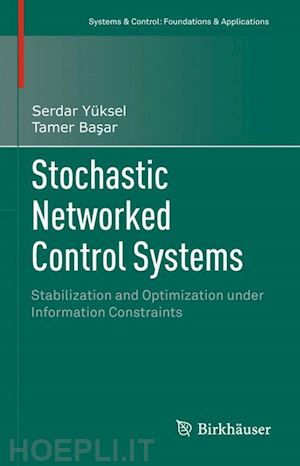
Questo prodotto usufruisce delle SPEDIZIONI GRATIS
selezionando l'opzione Corriere Veloce in fase di ordine.
Pagabile anche con Carta della cultura giovani e del merito, 18App Bonus Cultura e Carta del Docente
Networked control systems are increasingly ubiquitous today, with applications ranging from vehicle communication and adaptive power grids to space exploration and economics. The optimal design of such systems presents major challenges, requiring tools from various disciplines within applied mathematics such as decentralized control, stochastic control, information theory, and quantization.
A thorough, self-contained book, Stochastic Networked Control Systems: Stabilization and Optimization under Information Constraints aims to connect these diverse disciplines with precision and rigor, while conveying design guidelines to controller architects. Unique in the literature, it lays a comprehensive theoretical foundation for the study of networked control systems, and introduces an array of concrete tools for work in the field. Salient features included:
· Characterization, comparison and optimal design of information structures in static and dynamic teams. Operational, structural and topological properties of information structures in optimal decision making, with a systematic program for generating optimal encoding and control policies. The notion of signaling, and its utilization in stabilization and optimization of decentralized control systems.
· Presentation of mathematical methods for stochastic stability of networked control systems using random-time, state-dependent drift conditions and martingale methods.
· Characterization and study of information channels leading to various forms of stochastic stability such as stationarity, ergodicity, and quadratic stability; and connections with information and quantization theories. Analysis of various classes of centralized and decentralized control systems.
· Jointly optimal design of encoding and control policies over various information channels and under general optimization criteria, including a detailed coverage of linear-quadratic-Gaussian models.
· Decentralized agreement and dynamic optimization under information constraints.
This monograph is geared toward a broad audience of academic and industrial researchers interested in control theory, information theory, optimization, economics, and applied mathematics. It could likewise serve as a supplemental graduate text. The reader is expected to have some familiarity with linear systems, stochastic processes, and Markov chains, but the necessary background can also be acquired in part through the four appendices included at the end.
· Characterization, comparison and optimal design of information structures in static and dynamic teams. Operational, structural and topological properties of informationstructures in optimal decision making, with a systematic program for generating optimal encoding and control policies. The notion of signaling, and its utilization in stabilization and optimization of decentralized control systems.
· Presentation of mathematical methods for stochastic stability of networked control systems using random-time, state-dependent drift conditions and martingale methods.
· Characterization and study of information channels leading to various forms of stochastic stability such as stationarity, ergodicity, and quadratic stability; and connections with information and quantization theories. Analysis of various classes of centralized and decentralized control systems.
· Jointly optimal design of encoding and control policies over various information channels and under general optimization criteria, including a detailed coverage of linear-quadratic-Gaussian models.
· Decentralized agreement and dynamic optimization under information constraints.
This monograph is geared toward a broad audience of academic and industrial researchers interested in control theory, information theory, optimization, economics, and applied mathematics. It could likewiseserve as a supplemental graduate text. The reader is expected to have some familiarity with linear systems, stochastic processes, and Markov chains, but the necessary background can also be acquired in part through the four appendices included at the end.
Introduction.- Part I Information Structures in Networked Control.- Networked Control Systems as Stochastic Team Decision Problems: A General Introduction.- Characterization and Comparison of Information Structures.- Topological Properties of Information Structures: Comparison, Convergence and Optimization.- Part II Stabilization of Networked Control Systems.- Coding for Control and Connections with Information Theory.- Stochastic Stability and Drift Criteria for Markov Chains in Networked Control.- Stochastic Stabilization over Noiseless Channels.- Stochastic Stabilization over Noisy Channels.- Stabilization of Decentralized Systems over Communication Channels.- Part III Optimization in Networked Control: Design of Optimal Policies under Information Constraints.- Optimization of Real-Time Coding and Control Policies: Structural and Existence Results.- Optimal Coding and Control for Linear Gaussian Systems over Gaussian Channels under Quadratic Cost.- Agreement in Teams and the Dynamic Programming Approach under Information Constraints.- A Topological Notions and Optimization.- B Probability Theory and Stochastic Processes.- C Markov Chains, Martingales and Ergodic Processes.- D Markov Decision Theory and Optimality of Markov Policies.- References.- Index.











Il sito utilizza cookie ed altri strumenti di tracciamento che raccolgono informazioni dal dispositivo dell’utente. Oltre ai cookie tecnici ed analitici aggregati, strettamente necessari per il funzionamento di questo sito web, previo consenso dell’utente possono essere installati cookie di profilazione e marketing e cookie dei social media. Cliccando su “Accetto tutti i cookie” saranno attivate tutte le categorie di cookie. Per accettare solo deterninate categorie di cookie, cliccare invece su “Impostazioni cookie”. Chiudendo il banner o continuando a navigare saranno installati solo cookie tecnici. Per maggiori dettagli, consultare la Cookie Policy.